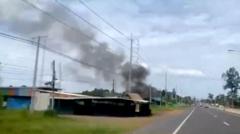In a dramatic escalation of hostilities, the Thailand-Cambodia border witnessed fierce fighting on Thursday, resulting in the deaths of at least 12 Thai civilians, according to local authorities. While the impact on Cambodia remains unclear, both nations have exchanged accusations regarding the origins of the violence, which first ignited in July with isolated gunfire. Following that, Thailand alleged Cambodian forces fired rockets, prompting retaliatory air strikes on Cambodian military positions.
The backdrop of this conflict is complex and historical. Tensions date back over a century to the demarcation of borders during the French colonial era in Cambodia. The situation deteriorated significantly in 2008 when Cambodia sought to recognize an ancient temple in the contested area as a UNESCO World Heritage Site, an action vocally opposed by Thailand. Clashes since then have sporadically erupted, leading to casualties among both military and civilian populations.
Recent hostilities have roots in a deadly encounter in May, following which both countries enacted trade restrictions: Cambodia halted fruit imports from Thailand and ceased vital services, further straining relations. Increased troop deployments have also added to the volatility at the border.
On Thursday, differing accounts of the skirmish emerged, with Thailand's National Security Council alleging that Cambodian troops began the conflict after surveillance drones were dispatched to monitor Thai movements. Conversely, Cambodian officials claimed that Thai soldiers instigated the hostilities by approaching a significant temple site, leading to a defensive response.
While both Thai Prime Minister Phumtham Wechayachai and Cambodian Prime Minister Hun Manet express a desire for restraint and peaceful resolution to the conflict, the lack of decisive leadership raises concerns regarding the likelihood of escalation into a larger conflict. Previous flare-ups have often led to swift de-escalation, but current dynamics may prove more challenging.
As concerns for civilian safety rise, the British Foreign Office has yet to issue a specific travel warning, although travelers are advised to exercise caution in the region, particularly near popular tourist sites like the Preah Vihear temple. Meanwhile, China has cautioned its citizens in Cambodia to steer clear of the contentious border area as tensions continue to unfold.
The backdrop of this conflict is complex and historical. Tensions date back over a century to the demarcation of borders during the French colonial era in Cambodia. The situation deteriorated significantly in 2008 when Cambodia sought to recognize an ancient temple in the contested area as a UNESCO World Heritage Site, an action vocally opposed by Thailand. Clashes since then have sporadically erupted, leading to casualties among both military and civilian populations.
Recent hostilities have roots in a deadly encounter in May, following which both countries enacted trade restrictions: Cambodia halted fruit imports from Thailand and ceased vital services, further straining relations. Increased troop deployments have also added to the volatility at the border.
On Thursday, differing accounts of the skirmish emerged, with Thailand's National Security Council alleging that Cambodian troops began the conflict after surveillance drones were dispatched to monitor Thai movements. Conversely, Cambodian officials claimed that Thai soldiers instigated the hostilities by approaching a significant temple site, leading to a defensive response.
While both Thai Prime Minister Phumtham Wechayachai and Cambodian Prime Minister Hun Manet express a desire for restraint and peaceful resolution to the conflict, the lack of decisive leadership raises concerns regarding the likelihood of escalation into a larger conflict. Previous flare-ups have often led to swift de-escalation, but current dynamics may prove more challenging.
As concerns for civilian safety rise, the British Foreign Office has yet to issue a specific travel warning, although travelers are advised to exercise caution in the region, particularly near popular tourist sites like the Preah Vihear temple. Meanwhile, China has cautioned its citizens in Cambodia to steer clear of the contentious border area as tensions continue to unfold.



















